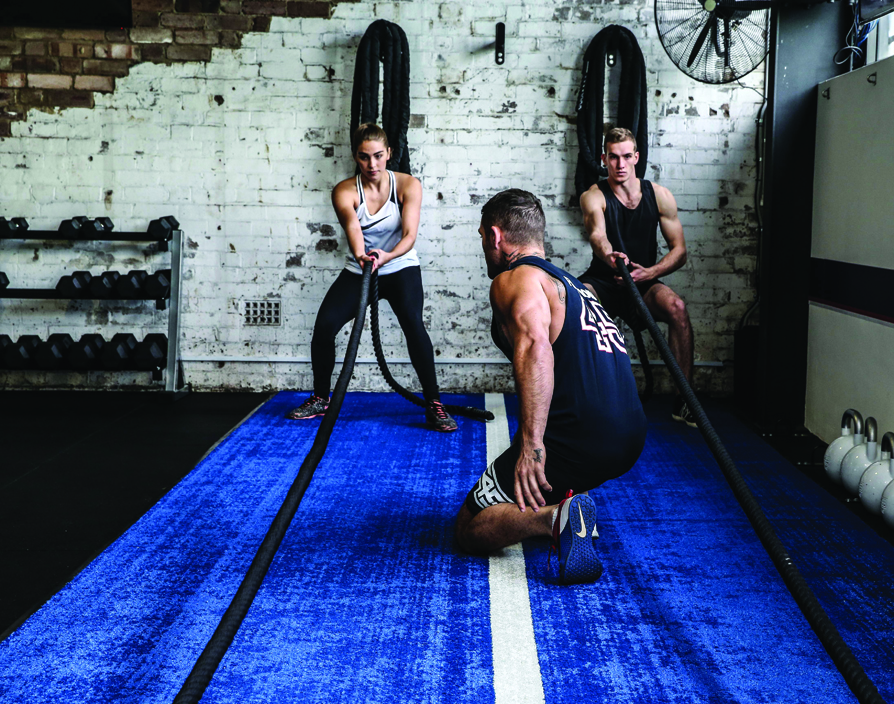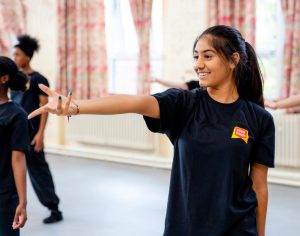With smoothie-bowl-serving organic cafes on almost every corner and a seemingly endless parade of activewear-clad gym bunnies, Sydney is arguably the health and fitness capital of the world. So it’s no surprise that F45 Training, a global fitness franchise, was founded in the city back in 2013. Rob Deutsch, a former equities trader and the brains behind the operation, has always been into working out but looking at the fitness options on the market, he could see there was a clear gap that nobody seemed to be filling. “You’ve got people spending maybe $20 a week on a gym membership but getting no innovation or motivation, so they inevitably stop going,” he says. “On the other end of the spectrum, some people were paying up to $80 for one-on-one personal training sessions. I wanted to create something that combined the two in a fun environment.”
Deutsch devised a programme that would act as a third way between a gym membership and a personal-training package: group sessions led by fitness instructors that came at a price point nestled between the budget and premium ends of the scale. Classes are based on the principles of HIIT – or high-intensity interval training. Instructors guide people through a series of high-octane, 45-second exercises with short breaks in between to help you catch your breath. The focus is on doing functional exercises – hence the F in F45 – which means you’re engaging multiple muscle groups at the same time. Classes last 45 minutes, after which you’ll leave a hot, sweaty mess and, as its website promises, “gasping for air”.
The timing couldn’t have been better for a concept like F45 to land: after years of slogging away on treadmills and peddling aimlessly on exercise bikes, people are increasingly turning to short but effective workouts like HIIT training. But is the franchisor afraid that F45 will go the way of fitness fads of days gone by? “A lot of the elements we use, like bodyweight exercises, plyometrics and weight training, have been around for years and because we don’t rely on just one type of exercise, there’s no danger of people getting bored,” he says.
The franchise is also designed to constantly surprise people with inventive new workouts: there are over 3,000 exercises and every three months 250 new ones are added, along with fresh equipment. So whatever day you pop into a class, you’ll be doing a totally new sequence. “If something’s trending in the fitness industry, we incorporate it, which keeps us relevant and helps people stay interested,” Deutsch says. And he’s betting that this commitment to preventing workouts from becoming stale and predictable is what will set it apart from established competitors like CrossFit and Orangetheory.
As for the business model, a forward-thinking Deutsch designed it to be franchise-friendly from the outset. “I could see that there was a global demand for what we were doing so it was only a matter of time before we expanded in Australia and beyond,” he says. This meant that very early on, he worked out how to systemise the formula and develop a training programme that was comprehensive and easy to roll out on a large scale. “We knew that once franchisees started joining we couldn’t be everywhere at once so we’ve made huge investments in processes and tech,” he says. “This means the business is scaleable and replicable across borders.” For example, new franchisees take part in an intense, five-day induction to learn every aspect of the business, from marketing to using its customer relationship management software. And it doesn’t end there: they can log into an intranet – referred to internally as The Playbook – to access detailed training videos and exercise instructions, which helps instructors and franchisees deliver a consistent service.
With the business in a franchise-ready state, the first franchisee came on board in 2014. They were joined by 375 more in the space of three years as the concept took off across the country, becoming a seemingly unstoppable fitness movement. “We were the fastest-growing franchise rollout in Australian history,” says Deutsch.”
And the franchisor largely chalks this lightning-fast growth spurt up to having a strong social-media community and the positive word of mouth created by franchisees, many of whom have a background in personal training and work hard to build their networks. “Social media’s been so important,” Deutsch says. “Most people pay ambassadors to promote their brand but our franchisees are some of the country’s best athletes and they’ve helped spread the word organically.” Each franchised location has its own social-media channels, where trainers post snaps from sessions and happy clients share their inspiring before and after selfies. The fact that models, celebrities and social-media stars have also been vocal about their love for the franchise hasn’t hurt either: for example Neighbours actress Olympia Valance credits her figure to its workouts. “These influencers are seeing results after training with us, which has helped us earn people’s trust,” says Deutsch.

Maria Barr
Maria was our web editor, who wrote profiles, new stories and features relating to the franchising world.

Maria Barr
Maria was our web editor, who wrote profiles, new stories and features relating to the franchising world.
































